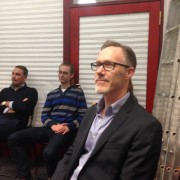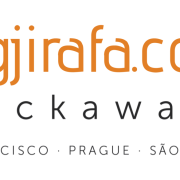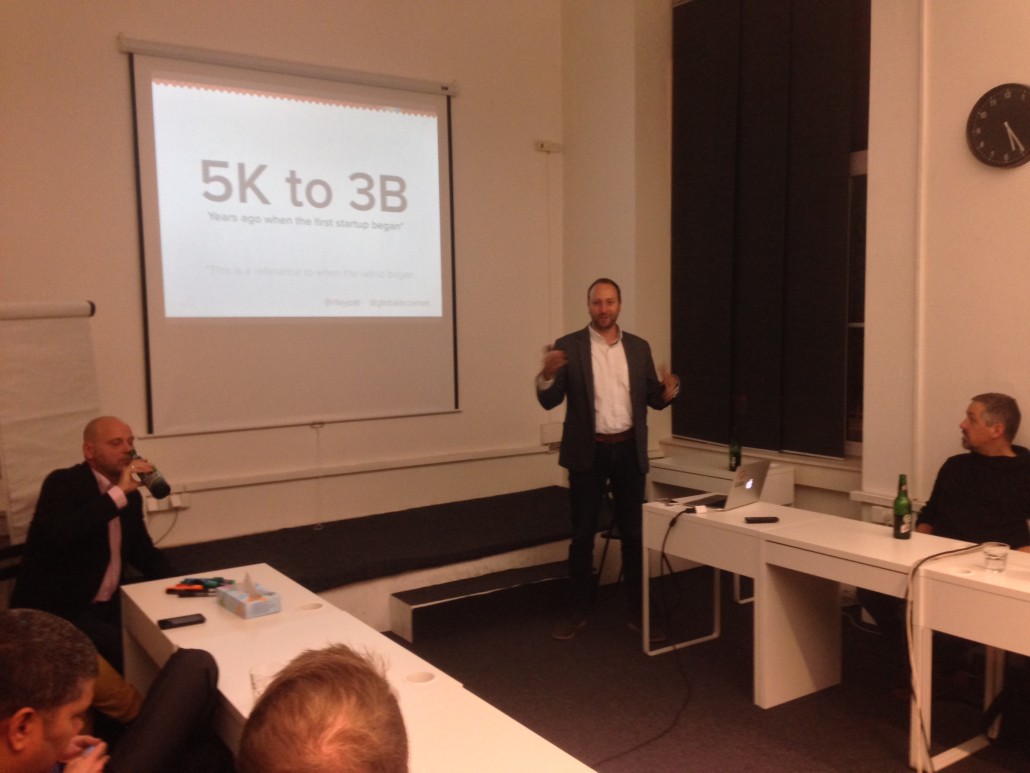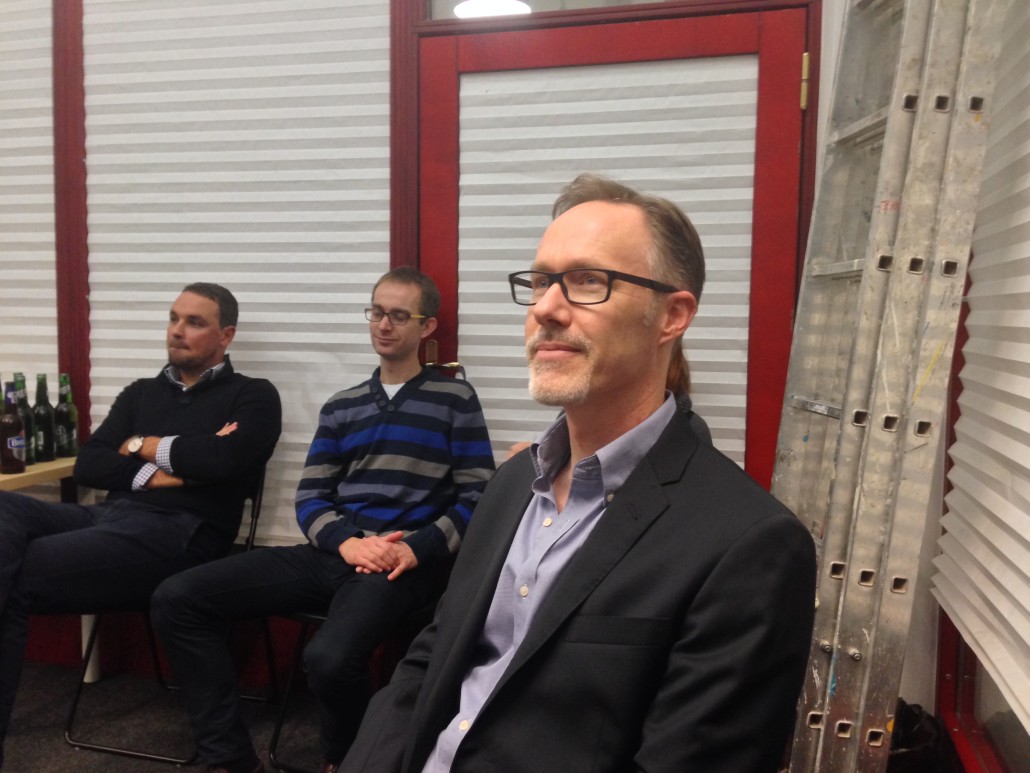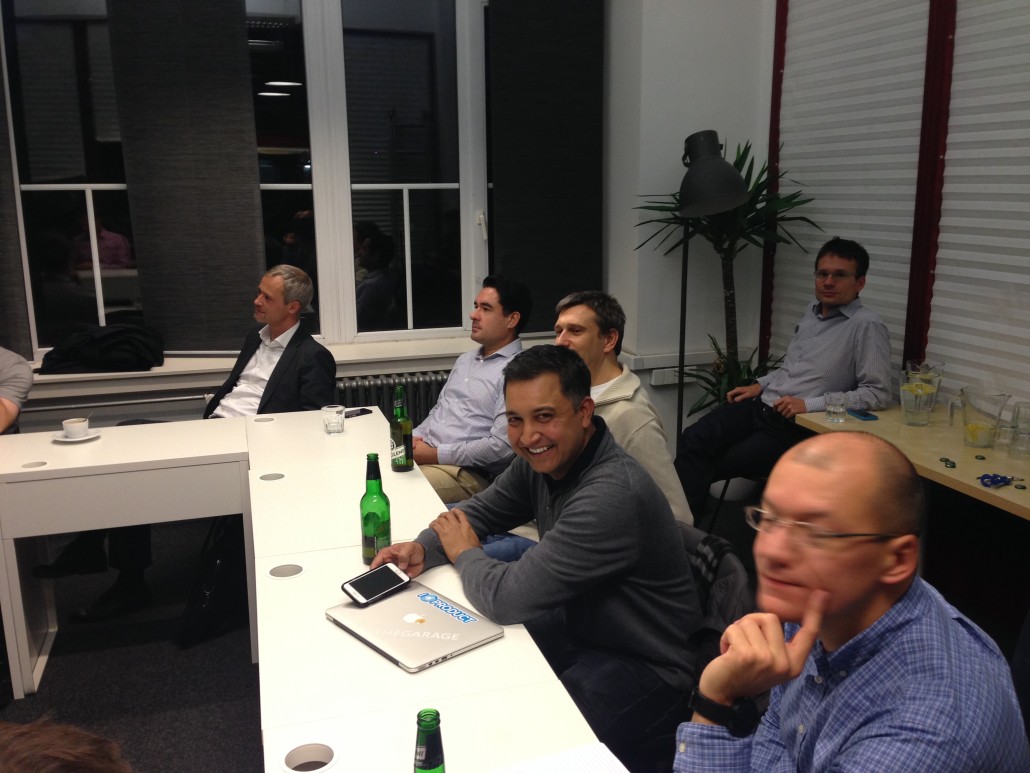StartupYard Raises 6 Million CZK Via Fundlift
/in Financing, StartupYard News/by StartupYardCampaign Met its Goal in Just 2.5 Weeks
Today we are pleased to announce that our recent private fundraising campaign, undertaken in partnership with FundLift.cz, has met its fundraising goal of 6 million CZK. The goal was met in less than 2.5 weeks and subscription closed on August 12th, with the participation of 40 selected private investors.
Feedback from our community and mentors generally was overwhelmingly positive. Well over 200 investors expressed interest, and community members and mentors were given priority. Still, many investors did not get the chance to participate this time. The funds committed by selected investors, StartupYard mentors, and friends of the accelerator will go towards accelerating up to 10 Startups in our upcoming round- StartupYard 2016/2, with applications closing September 30th.
This experience has shown us that the appetite for, and interest in, data focused startups in the CEE region is stronger now than ever. That’s good news for startups, and it’s good news for StartupYard. We would also like to take this opportunity to praise the team at FundLift for their professionalism, and their help in allowing our mentors and community members to participate as investors. This effort would not have been successful without FundLift.
StartupYard CEO and Managing Director Cedric Maloux had this to say:
“I am struck once again by the enthusiasm of our community for the work we do, and for helping startups in the region to gain the experience and investment they need to grow on the global market. Our mentors once again have shown they are committed and invested in the success of startups in the region, and that they are willing to step up when it counts the most. These funds are not only a big boost to the startups in our program, but a sign that Central Europe has a bright future as a center of innovation and smart risk-taking.”
What Happens Next
Now we will need the help of our dedicated community and investors to put these funds to their best use. If you know a startup or a team of entrepreneurs who are ready to accelerate their data-focused startup, and launch on the global market, please let them know that StartupYard is looking for them to apply.
StartupYard is looking for #dataeconomy #startups to invest in. Application deadline Sep 30th! http://startupyard.com/apply Click To TweetOnce again, we thank our community and investors for showing their faith in StartupYard, and we look forward to working with some of the most interesting startups in Central Europe this winter.
SY 2016 Alum ClaimAir Secures 140,000 Euros In Angel Round
/in Financing, StartupYard News/by StartupYardWe’re pleased to announce that this week, yet another of our 2016 Startups, this time the legal and travel startup ClaimAir, has raised an angel investment round, totaling 140,000 Euros.
Claimair helps travelers easily get flight and baggage compensation from airlines, averaging over 400 euros per claim. The round was led by notable angel investors including StartupYard mentors such as Philip Staehelin of Roland Berger, and Michal Kratochvil (now also CEO of SY Alum BudgetBakers). StartupYard also contributed follow-on financing to add to the total.
Congrats to @Claimair, raising 140,000 euros from an Angel group and @startupyard. Way to go team! Click To TweetThis latest news, following investments in several other, 2016 Startups, brings the total for investments in StartupYard startups in 2016 alone to nearly 3 million euros.
Claimair: Making Claims Seemless
The investment will enable ClaimAir to develop B2B focused technologies that will help partners such as booking engines and travel agencies serve their own customers better, and to expand its service globally, quickly ramping up the team to meet growing demand.
“The first time I spoke with Jakub, the CEO of ClaimAir, his pitch seemed almost too good to be true,” said angel investor Philip Staehelin of Roland Berger, “however, after a few meetings, it was his market knowledge, single-minded drive, intelligence and leadership qualities that made me into a believer, and eventually an investor. Jakub and his strong, dedicated team are quickly proving the market’s huge potential, and the group of angel investors is keen to help them rapidly scale up their business. ClaimAir offers a fantastic service that airline passengers love – their value proposition is easy to understand and simply a no-brainer for any one that flies.”
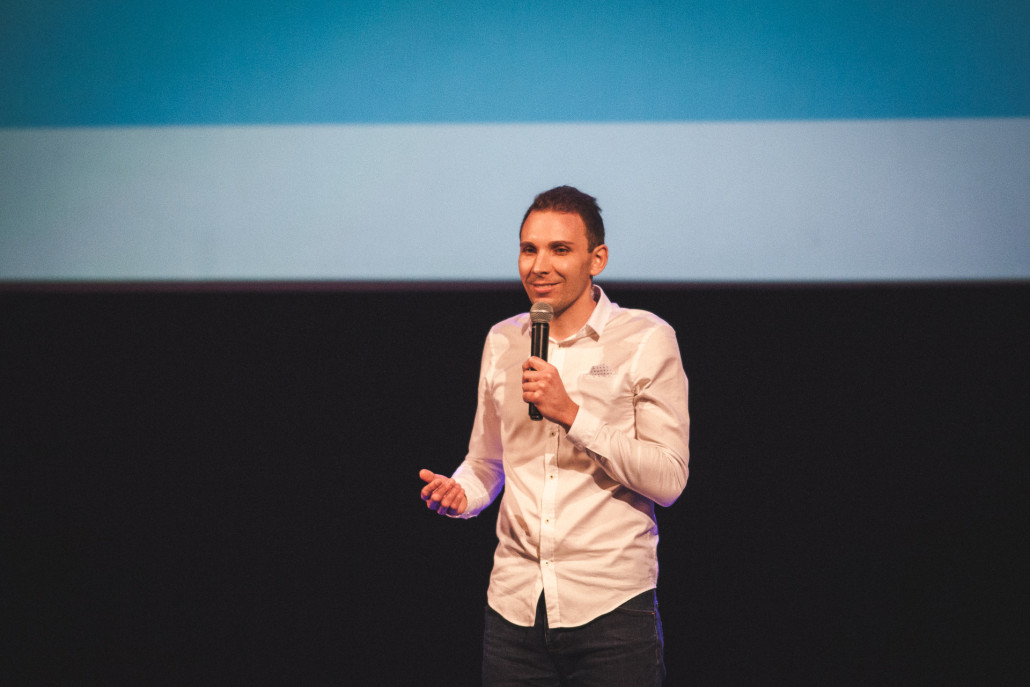
Jakub Ladra, of ClaimAir, talks flight compensation.
Room to Grow in a Multi-Billion Euro Market
Claimair, recently accelerated at StartupYard in Prague, has doubled its revenues since early 2016, and expanded its network of legal representatives and corporate partners around the world. They’ve has also been featured in the press, including Forbes and an interview on Czech Television.
The market in which the company operates is massive, and growing. About 8 million passengers fly every day, and more than 800,000 of them are affected by some kind of flight problem. However, less than 1% of those passengers actually get compensations owed according to European and other regulations, and many aren’t aware that compensation is even due. Claimair is working to make the claims process easier, and even in many cases, automatic.
“I am extremely happy that we have made our angel investment with such a great team of investors,” said ClaimAir founder and CEO Jakub Ladra, “It will help us to fulfil the main goal at ClaimAir, which is to develop a solution that allows people all over the world to get what airlines lawfully owe them, without any fuss. We have already helped hundreds of clients, but this is only the beginning. You may dread flight delays, but with us working for you, our hope is that we can bring a silver lining into the lives of millions of air passengers.”
Congratulations to the ClaimAir team! We knew you could do it!
StartupYard Alum SpeediFly Raises 300K In Seed Funding
/in Financing, Startups, StartupYard News/by StartupYardFor the second time in a matter of a few weeks, StartupYard is very pleased to announce that yet another StartupYard alum, SY 2016’s SpeediFly, has raised 308,000 euros in seed investment from Czech startup investor Petr Zamecnik.
Congratulations @SpeediFly raising 300K from Czech investor Petr Zamecnik via @startupyard Click To TweetThis is Zamecnik’s second investment in a StartupYard startup- it follows the recent announcement of his involvement with BudgetBakers’ (SY 2015) comparatively sized funding round. The investment includes follow-on financing from StartupYard, in the form of an equity-free grant, supplied thanks to the European Commission’s FIWARE Accelerate program.
Making Sharing a Flight as Easy as Sharing an Uber
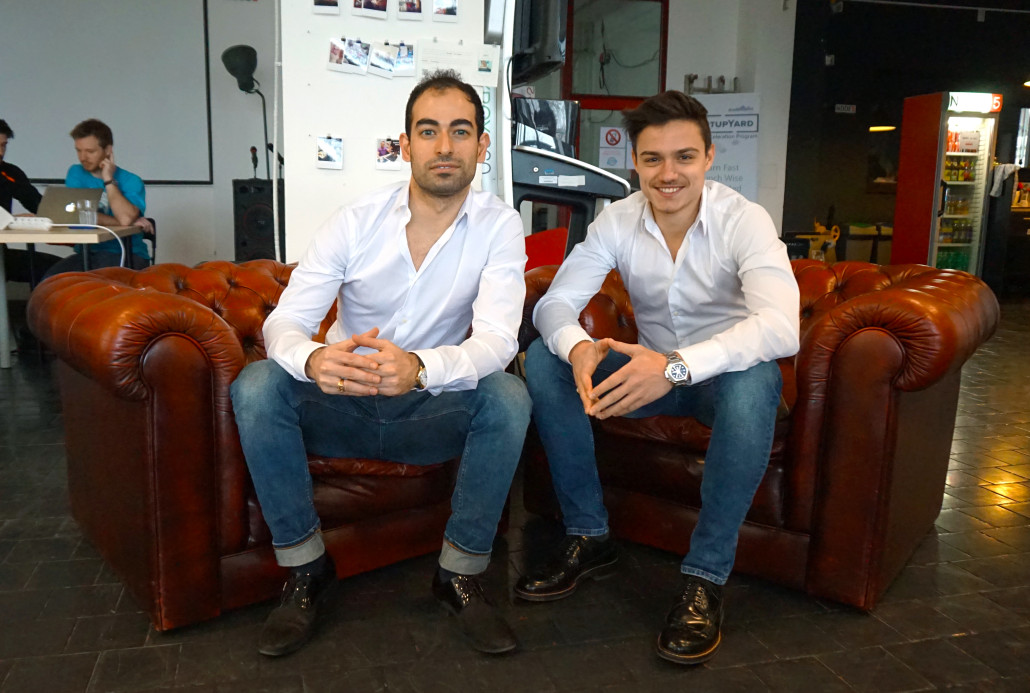
Co-Founders Alex Karadjian, and Stoyan Dobrev
The team, which will work from both London and Sofia, Bulgaria, has launched a private beta in London, where it acquired its first customers in April this year. SpeediFly is a mobile-first travel platform that aims to make booking a last minute flight, even as a group, as easy as sharing a ride on Uber.
The funding will be used to expand the Bulgarian development team, and launch SpeediFly in several European markets, including London, and other major travel hubs.
The team also plans to develop the social travel aspects of the platform, as well as interest based travel recommendations that will allow travelers to combine their favorite activities with the best last-minute travel deals.
Currently in beta for iOS, SpeediFly also plans to expand to Android and the web. The new funds will also be used to expand the platform’s smart recommendation and group booking systems, two core features that will differentiate the startup from other entries in last-minute travel.
A Czech Investor on the Move
Our own Managing Director Cedric Maloux said of the investment round: “It’s not every week that two great companies from our portfolio get the financing they deserve. Zamecnik has made two smart and gutsy moves with these two startups [BudgetBakers and SpeediFly], and we hope that his peers in the region and abroad will take notice.”
Also commenting on the investment was SpeediFly’s Co-Founder and CEO Alex Karadjian, who said: “this will help us scale super quickly and go to new markets, but what is even more exciting to me, at least at this early stage, is the natural bond our team has had with Petr from the very moment we met. Petr’s fast-moving style as an investor and businessman perfectly aligns with the spirit of our team and with our concept- which is all about spontaneity and fun. I am sure this is going to be a great journey together.”
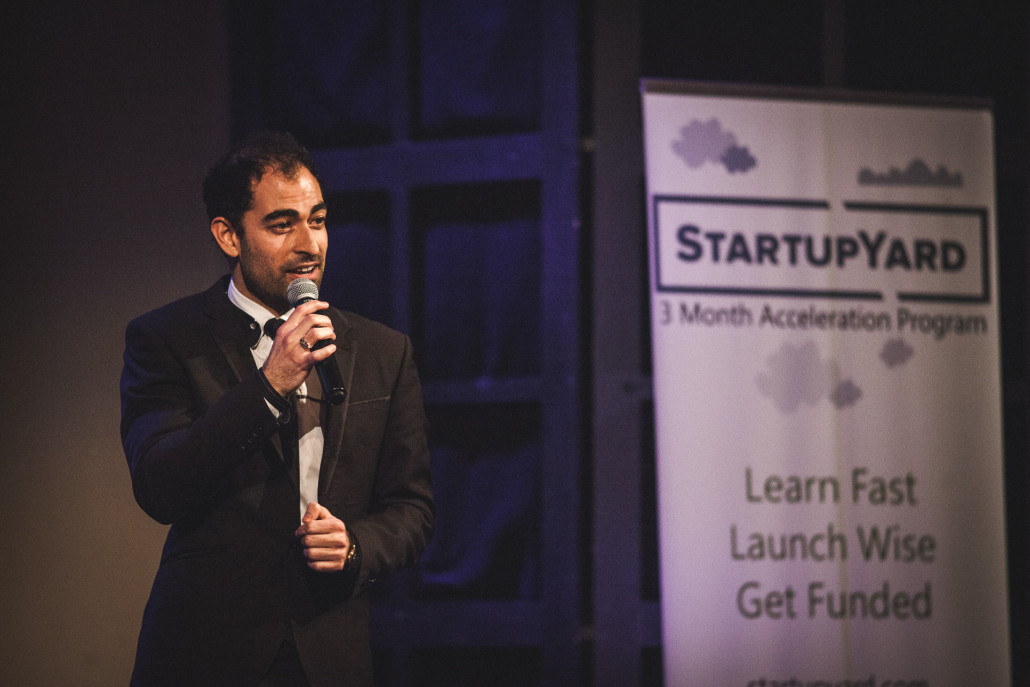
Alex Karadjian of Speedifly talks about social, spontaneous air travel at StartupYard’s 2016 DemoDay
SpeediFly was founded in late 2015, and joined StartupYard in 2016. It aims to be the market leader in mobile-first, social, last minute travel. In the UK alone, the company estimates that there is an untapped potential of 10.2 billion Euros in the last minute travel market. In addition, 56% of European travel searches for last minute bookings are for groups of 3 or more- while none of the major meta-search engines specialize in group bookings, social features, or shared payments.
SY Alum NeuronSoundware Wins Vodafone Napad Roku
/in Financing, Startups, StartupYard News/by StartupYardWe are incredibly pleased to announce that StartupYard 2016 team Neuron SoundWare, has won the prestigious competition Napad Roku. Napad Roku is put on by Vodafone Foundation to find the best ideas from Czech and Slovak startups, and bring them onto the global stage.
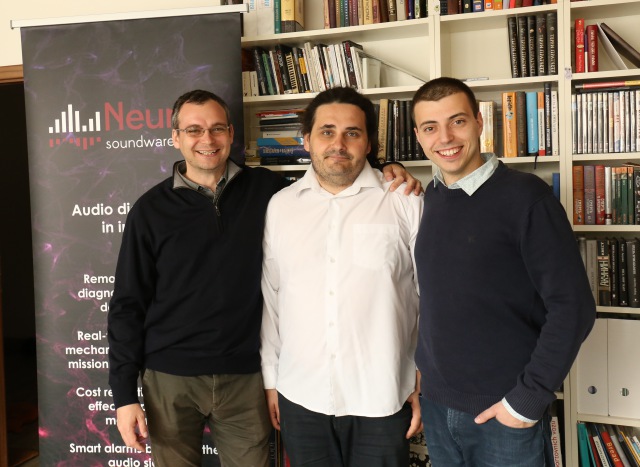
The Neuron SoundWare Team: Photo by Forbes.cz
Also among the top finishers was our own Salutara, enabling medical travel worldwide. This win represents yet another in our alumni’s series of recent successes.
The prize includes 300,000 CZK (11,000 Euros) from Vodafone Foundation, additional funds for legal services, and new tablet computers.
Napad Roku: The Best of Czechia and Slovakia
Neuron Soundware, led by Co-Founder and CEO Pavel Konecny, won out against over 170 competing startups. The company is building a framework for neural networks to understand, learn from, and process sounds. As reported by Forbes recently This will enable their technology to, for example, diagnose technical problems in heavy machinery and sensitive hardware, including such things as 3D printers, car engines, and air conditioning systems, among much else.
The technology can also be applied to the voice: at StartupYard’s recent DemoDay, where Neuron Soundware premiered the pitch that won at Napad Roku, Konecny demonstrated how a neural network could listen to, and then perfectly reproduce a human voice, opening up the possibility of using natural human voices instead of computer generated voices in any range of applications, from call centers to robots. The technology also makes manipulation of the voice possible, changing accents, inflections, emotional tone, and much else.
This opens possibilities for the NeuronSoundware team in a wide range of industries, from AI personal assistants like Viv, to industry 4.0 and distributed “contour” manufacturing technology, where more and more products will be fabricated in smaller factories, closer to their destination markets.
Congratulations to Pavel and the whole NeuronSoundware team!
 Pavel with CoFounder Filip Sedlak
Pavel with CoFounder Filip Sedlak
 Pavel Konecny, CoFounder and CEO
Pavel Konecny, CoFounder and CEO
Philip Staehelin of Roland Berger: Czech Republic a Gateway for Startups
/in Financing, Interviews, Startups/by StartupYardPhilip Staehelin is a StartupYard mentor and investor, and former StartupYard Executive in Residence for 2015. He currently serves as Managing Partner for Roland Berger Consultancy in Prague, with a particular interest in connecting startups with corporate partners. Philip is also a key investor in Gjirafa, a StartupYard company, which recently raised $2 Million from Rockaway Capital.
The following is a lightly edited translation of an interview with Philip that appeared in January in Lidové Noviny. The author is Jan Zizka. Some of the content has been slightly altered for clarity, and several questions have been shortened or removed.
Lidské Noviny: Few have as much experience with Czech startups as globetrotter Philip Staehelin, who has been living in Prague for over two decades. Staehelin merges two different worlds – he has not only been (and still is), very active within the ecosystem of promising startups, but he also has broad experience from various managerial positions in a number of large enterprises. As the new head of the Prague branch of the Roland Berger consultancy, he confirms in this interview that he has clear plans to recommend, even to traditional corporations, learning from the flexibility and the creative mentality of startups.
Silicon Valley, maybe Switzerland, or Israel, is what comes to everyone’s mind when talking about startups. But I’m not sure what the current situation is in Central Europe. Poland, perhaps? Do you think we have already made at least a small step forward for people to associate Prague and/or Brno with startups?
PS: Well, it’s absolutely clear when you include Berlin in the CEE area. There is a real, huge boom of startups, and many investments are now oriented towards Berlin‘s direction. In my opinion, there is enough interesting potential within the Czech Republic as well, but I am not convinced that Prague can become the next startup hub like Silicon Valley, London or Berlin. However, Prague may serve as a kind of funnel and launch pad for startups from the entire CEE region.
Alongside other roles, I’m a mentor and advisor in StartupYard, a startup accelerator which is helping to shape Prague into such a role. For instance, TeskaLabs, a company dealing in mobile communications and IoT (Internet of Things) security, went through our accelerator. Then they were accepted to a leading London accelerator (TechStars).
So people who focus on this business in Prague will be following all startups in the CEE region? Or will early stage investors still be found locally, and other investors from London or Silicon Valley will join them later?
This is one of the possibilities. The key idea is to achieve wider coverage ,which will help Prague become a startup gateway – a bridge from East to West. As for StartupYard, for example, it’s closely linked to Slovakia and Hungary.
The key question is what it will look like here for the investors. In the past, only very limited funds were available. Nonetheless, the appetite for risk, which is obviously closely associated with investments in startups, has recently increased. The competition exists even on the investors’ side. There is also governmental support, albeit still insufficient. However, it’s not the same money as in Silicon Valley yet. Investors here are not giving out finance into concepts or ideas; they rather go after companies that already generate some revenues.
Yes, previous governments experienced that weakness when they started to build up the so-called “Seed Fund” for projects at an early stage. Will it still be very difficult to find other investors for those projects in the research phase?
This surely is a weak point. Yet, I’m not suggesting the government offer money itself to anyone who applies with some “startup.” It would not lead to any better outcome. The state should provide resources to the existing venture capital funds. Or to accelerators, for example.
In StartupYard, we have utilized European funding for the past two years, which helped a lot. But our government can take a number of other useful steps. They can provide support in creating the right eco-system for startups. Although financial aid is very important, it is still just a side-effect in comparison with shaping simple and transparent entrepreneurial environments.
Speaking of the new state-owned National Innovation Fund, are you a sceptic?
Yeah, I am definitely skeptical, but at the same time I have some hope. We need something like this. However, I know how much of the state-provided money has disappeared in past years, without that being reflected in the improved performance of companies.
So I have strong hopes that is isn’t just another opportunity for corruption, and that this money would indeed assist in changing the whole business atmosphere.
The problem is to ensure such a fund is well-managed. Because if you take a look back at the history, you’ll see that similar projects here haven’t been managed well.
The Ministry of Industry and Trade wants the new fund to invest along with private investors. Is that vital to success?
Fortunately, our government representatives do realize that they aren’t much good at choosing startups with potential. The state is not a professional investor, and wants to be assured that someone else will be involved, and put their own capital into selected projects. The question is whether it can be guaranteed that this money isn’t being allocated to family, relatives and/or friends of those who would be responsible for managing such a fund.
You said that the state has other, more important roles to play.
They should definitely care more about the actual conditions under which new companies are incorporated in the Czech Republic. In comparison with other countries, we are really backwards when it comes to the difficulty involved. Surprisingly though, the situation is even worse in Germany. Still, most other countries in Europe have much more favorable systems. Poland, for example. And Estonia is the bellwether for innovation.
I often hear that we are fighting corruption, while the issues of the entrepreneurial environment itself are cast aside. Do you agree with that?
Well, fighting corruption is extremely important. If you grant hundreds of millions to startups, it can seem like a lot. But it’s still just a fraction of what has been stolen in this country. I was an active member of the Administration Board for Transparency International for several years, so the topic is close to my heart. Czech firms simply won‘t be able to reach their potential without ending all the graft. If the government could prevent the misuse of public money, and was able to use it properly with promising new companies, that would have tremendous effects.
Just to name a successful example – consider anti-virus experts such as AVG or Avast. They help our economic growth and they employ many people. And on top of that, they are promoting the whole country abroad. We can dare say we are leaders in internet safety because of them.
Some in Czech business circles would tell you that even today, banks will remain central to financing here. The Prague Stock Exchange has no particular reputation, but banks can’t be replaced, and VCs can’t save us. Moreover, banks have more liquidity, and tend to claim they can’t find good business plans or interesting projects.
Banks are too careful when it comes to risk, as part of their basic makeup. And definitely they are not the best choice for startups. As I already mentioned, even some venture capital funds here are risk averse. Which is obviously quite a difficult situation for startups – usually with no assets and frequently being “one-garage” style firms. They have computers and that‘s it. So very often, they have no other options but to ask their friends and/or family for seed money. Then, so-called angels might get involved – individual private investors. However, from all these relatively small investments you can end up with a nice sum to start with.
And local price levels help too. A few years ago, I personally invested in Video Recruit, a startup that was able to survive here with just EUR 300k for three years. In London, by contrast, you couldn’t live longer than six months on that.
Who are these angels? As far as I know, businessmen like Zbyněk Frolík of Linet or Eduard Kučera from Avast are investing in startups more and more. Do others invest as well, after selling their own businesses, or delegating management to others?
Yes, there is much more funding coming from people who are themselves successful as entrepreneurs. Still, they need better access to startups. That is where the aforementioned accelerator model might be useful, as many great entrepreneurs are involved there as mentors.
To become an investor, you don’t need millions. An investor can be managers who have just done well enough. Another example: a company that went through the StartupYard accelerator a few years ago was an “Albanian Seznam,” called Gjirafa. Our mentors were among their first investors.
As the new Roland Berger Managing Partner, you plan to focus on cooperation between large corporates and interesting startups. Why are you so driven to connect these two seemingly diverse cultures?
You’re right. I am very excited about this, and for multiple reasons. I used to work for T-Mobile, as a member of its international team for innovations. We came up with a few nice ideas, but the company then lacked the ability to work with and develop them. That was about eight years ago; and large companies, including T-Mobile, have changed a lot since then. Today, there ‘s much more understanding that driving innovation is important, and that there are lessons to learn from the flexible approach of startups. The question now, is how.
They can try to incorporate startups into their own structure, but oftentimes startups don’t want that. They don’t want to become just a smaller part of a big unit with overwhelming administration, with no room for development and growth.
What’s your solution?
Startups can stay outside large enterprises, keeping their uniqueness and creativity, but still working cooperatively. Corporations can then create, in collaboration with these startups, some kind of innovation lab where ideas can be worked on. This mode of cooperation is highly fruitful for startups, especially if they get at least some financial support from a bigger company. This is not to mention the advantage of an enterprise’s customer network.
Yet, there is another model available – creating corporate venture capital companies, and buying shares in prospective firms that are relevant to their overall strategy. As a big plus, you don’t have to put all your eggs in one basket.
It occurs to me that you personally represent a good example of combining these two worlds – you probably aren’t a very typical head for such a traditional consultancy as Roland Berger.
True. I have been a consultant before and wasn’t sure whether to return to the role or not. Though, I had a long discussion on innovation with a global head of Roland Berger, who aims to lead this company more deeply into the digital world and to a new mix of consulting, technology and private equity. This is a very nice, thrilling vision and also completely in line with my own convictions.
To what extent will this be attractive for Czech companies without foreign ownership? Merging trans-national corporations and startups might seem to far afield for them.
There are many types of innovation. Some Czech companies have agreed to try innovating inside their establishments according to the Industry 4.0 concept. In other words, to integrate the latest technologies and maximize the value of what they already do. And it can work out pretty well because a lot of local firms are very specialized in one particular segment. But it might be helpful even for them to be inspired by a startup mentality. I think also that Czech companies must stay open and try many paths. If something fails, it’s rational to try something different.
Do you think the whole concept of Industry 4.0 is more than marketing jargon? Is it an exaggeration to call this the 4th industrial revolution? Computerizing, digitalization – we’ve seen all this already as a part of the third one.
I am an eye-witness to the fact that this really is the fourth revolution, and I don’t think this is a matter of mere marketing. If companies succeed in gathering data from each & every machine and interconnect all processes ,from logistics to production, that’s an appreciable progression towards higher efficiency.
The Industry 4.0 principle relies not only in applying automation and robotics on your manufacturing processes, but also in integrating all data into your planning – wherever that data comes from (both inside and outside) – and working with it efficiently.
To put it simply, a brewery will be able to connect information on how a climate phenomenon like El Nino may influence this year’s harvest yield, together with historical details on how similar weather swings affected beer consumption in the past, and adjust their strategy for the future accordingly. Or you can easily detect in advance when one of the production line components might break down, or wear ou,t and avoid that by performing pre-emptive maintenance.
The Industry 4.0 concept came here from Germany. My question is a bit wider though – do you think it’s good that the Czechs are so strongly linked to the German economy?
Actually, this is more of a political question… Look, we are such a small country, there are just ten million of us.
Did you really say „we/us“?
Yes, of course. I’ve been living here for more than twenty-two years, I obtained Czech citizenship last year. My wife is Czech as well as both my kids. And I also became a big fan of the Czech national hockey team…
So you are eligible to vote as well.
I will definitely vote, but it will be a tough decision to make. Anyway, I do think we have no better option than our relationship with Germany. I am a bit worried about that element in Czech society that is pulling us back towards the Russian sphere of influence again. So I am willing and happy to be a German ally, vven if neither is perfect nor ideal. But we can benefit immensely from the German industrial base being as strong as it is.
On the other hand, that doesn’t necessarily mean Czechs shouldn’t strive to enter other markets. I gladly support market expansion. And well, if our local startups can be a part of the global scene, it will be a massive thing for the Czech economy.
StartupYard Alum Gjirafa.com snags $2 Million Investment From Rockaway Capital
/in Financing, Startups, StartupYard News/by StartupYardStartupYard is very excited to be able to announce a day we have been anticipating for some months. It’s now official. Global investment firm Rockaway Capital has invested $2 Million in StartupYard all-star Alum Gjirafa.com. The investment is aimed at growing the Balkans’ internet economy, and making Gjirafa, which is based in Kosovo and Albania, the regional leader in search, ecommerce, and online advertising.
Read the Story on TechCrunch.
Mergim Cahani, Co-Founder and CEO of Gjirafa, joined StartupYard as part of our 2014 cohort, and has continued to stay in close contact as a mentor and advisor for our startups. Rockaway Capital is also a StartupYard investor.
The investment follows Rockaway’s aggressive moves in European e-commerce investments of recent years, and it follows earlier investments in Gjirafa from angel investors, including Yandex’s Esther Dyson, Credo Ventures Partner Ondrej Bartos, and Roland Berger Managing Partner (and former StartupYard Mentor in Residence) Philip Staehelin. Gjirafa secured its first angel investments while attending StartupYard.
This new capital will allow Gjirafa to expand more aggressively in the Albanian speaking regions of the Balkans. The deal also calls for Rockaway to commit considerable resources to bringing other internet properties to Albanian language audiences and businesses, building up the internet economy in the region in partnership with Gjirafa.com.
Gjirafa plans to advance Albania and Kosovo’s first native AdNetwork. They will also introduce e-commerce into the region, where the majority of people own no credit cards, but where the internet population is mobile-first, with over 50% of internet traffic going to smartphones. 70% of the populations of Kosovo and Albania are under the age of 35, presenting a huge capacity for growth in e-commerce and advertising going forward.
“This investment is more than just a bet on the explosive growth potential of the Balkans’ internet economy,” noted Gjirafa’s Founder and CEO, Albanian native Mergim Cahani. “ It’s going to help us accelerate that growth by bringing online services to the region that have never been seen here before.” Cahani has built the search company into a fast-growing organization, boasting 650% growth from late 2014, over 10 million searches executed, and over 1 Million visitors in the past 10 weeks alone.
“This is a clear validation of the potential we have seen in Mergim Cahani and the whole Gjirafa team since we invited them to join StartupYard in 2014,” said StartupYard Managing Director Cedric Maloux. “It’s also a vote of confidence in the StartupYard community and program. This is a smart bet for Rockaway, and a big deal for every day people and businesses in Kosovo and Albania.”
The StartupYard Startup Reading List
/in Financing, Marketing, Starting a Business, Startup Tools, Startups/by StartupYardIf you follow us on Twitter, you probably know that StartupYard is constantly sharing great content with our followers. Internally, we also keep a “reading list” of items we think our startups should read before, during, or after the program. This is the StartupYard Startup Reading List.
With a new acceleration round beginning next week, we thought we’d share the list we’ve compiled. It’s organized into Collections, Launch, Sales and Conversions, Retention, Growth, Marketing, and Free Stuff.
Under each item is a short extract from the link. If an extract wasn’t available, we added a short summary. Enjoy!
-The StartupYard Team
Collections:
http://startupstash.com/
40 categories of curated tools and tips for Startups. A must have.
http://marketingstack.io/
28 categories of curated Marketing advice and tips. A must have.
Launch
Quick and Dirty Guide to Launching your Startup in 2015
There are plenty of blogs out there that talk about paid advertising, social media, offline distribution, content marketing, SEO, SEM, e-mail marketing and so on. But I will be focusing on actionable items you can do to get your first 1,000 users in a weekend’s time and with less than $500 of investment.
16 Startup Metrics
We have the privilege of meeting with thousands of entrepreneurs every year, and in the course of those discussions are presented with all kinds of numbers, measures, and metrics that illustrate the promise and health of a particular company. Sometimes, however, the metrics may not be the best gauge of what’s actually happening in the business, or people may use different definitions of the same metric in a way that makes it hard to understand the health of the business.
The apps that help you bootstrap | Highfive
Wouldn’t it be nice to have a business idea today, and have that business up and running tomorrow? With today’s apps it’s totally doable.
Sales And Conversions
Complete SAAS Guide to Calculating and Optimizing Lifetime Value
Getting new customers is good. Keeping a customer and getting them to continue paying is better.
Conversion Optimization Psychology
Why are contrasting buttons effective? Why should you use 1st person CTA wording?Why (and when) are trust symbols effective?
Conversion Rate Optimization: Startup Growth Lessons
Some call it – *cough* – growth hacking. Others call it optimization. But what we’re all talking about, really, is crazy smart, innovative, results-driven, product-focused marketing that has an outsized impact on your company’s growth and bottom line.
Retention
Hooked Retention
How GrowthHackers(.com) Uses “The Hook Model” to Foster Incredibly High Member Retention
Why You Need Cohorts to Improve Your Retention
You need to dig deeper into your app using a method called cohort analysis. That’s how you’ll identify how well your users are being retained and the primary factors that will drive growth for your app. Here’s how the most experienced and analytical product people like Siqi go beyond your standard cohort analysis to do it.
Growth is Good, but Retention is Forever: 500 Startups VIDEO
A video from 500 Startups on Retention, and why it is eventually more important than growth.
Growth
The Ultimate GrowthHacking SourceBook
30,000 words of modern-day growth hacking strategies for the discerning SaaS growth hacker.
SaaS Metrics 2.0 – A Guide to Measuring and Improving what Matters
This article is a comprehensive and detailed look at the key metrics that are needed to understand and optimize a SaaS business. It is a completely updated rewrite of an older post.
43 lessons growing from $0 to $1+ million in revenue, twice
I realized the other day that we’ve grown from $0 to $1 million with two separate products (HelloSign and HelloFax). This happened a long time ago, but I was recently reflecting on the lessons.
Growth Hacking: VIDEO, Neil Patel
Pierre Lechelle: Growth Hacking Strategy
When thinking about Growth, most people think about CRO (Conversion Rate Optimization) on the ToFu (Top of the Funnel). They don’t really understand what is the power of Growth.
How segment models growth for two sided marketplaces
Frameworks help us organize and understand the world, and data helps us stay focused and monitor progress. So, it’s no surprise we use them both to help us project future growth and figure out how to hit our lofty goals.
Build a Growth Machine Like Andy Johns
Andy Johns has had the good sense to ride not one, but FOUR rocket ships. He has been a key member of the growth team at…
13 Growth Hacking Techniques You Can Apply Right Now
Growth hacking is the idea that an entrepreneur can take a clever non-traditional approach to increase the growth rate and adoption of his or her product by ‘hacking’ something together specifically for growth purposes. Most startups find themselves facing the same problem: they build a product that no one ends up using. Say you have…
Video: 10 Habits of High-Growth Startups by Sean Ellis – GrowthHackers
Sean’s talk at the DEMO Traction Conference.
The Ultimate List of B2B Growth Hacks
Marketing
How We Addressed our Main Content Marketing Pain by Outsourcing to Freelancers
Today I’d like to share with you one of the biggest marketing struggles we experienced at Ivalua, the previous company I worked for and where I handled Marketing for over 2 years: content creation – and how we overcame it leveraging freelance writers.
Why You Need to Create a Content Marketing Strategy
The most popular digital marketing mantra in recent years has been “Content is King”, and while the mantra itself may be a touch overused, it is by no means inaccurate. Now more than ever it’s incredibly important to create a content marketing strategy and make it your your own unique content marketing strategy if you hope to drive traffic and boost brand awareness from online channels.
Persuasive Writing Techniques
Design, SEO, and advertising can only get you so far. If you want to accelerate sales online, you need persuasive copy. According to Harvard Business professor Gerald Zaltman, 95% of our purchase decision occurs in the subconscious mind. Most marketers ignore how our brains work and fight against human psychology.
SEO Tools
153 succint reviews of SEO tools, by Brian Dean
Paddle: App Marketing Ebook
Paddle’s guide to app marketing explores the techniques developers can adopt to drive more downloads and grow their apps.
The science behind killer landing pages
A great list of the essential elements of a landing page, and why certain types of things work for conversion.
ViperChill’s Private Niche Project
A fascinating, if amoral, view of online marketing and networking building
What Startups Need to Know About Content Marketing
With content marketing, you can educate and engage potential clients while differentiating your company and positioning it as an industry leader.
The definitive guide to lead generation Facebook ads
In marketing, lead generation is the generation of consumer interest or inquiry into products or services of a business. For the purpose of this article, lead generation refers to the generation of consumer interest. A list of qualified leads is a priceless asset for your company. It’s cheap to build and works great for every kind of business, including “boring” B2B companies.
CopyWriting Tips
- Which words do you choose?
- How do you frame the offer?
- How can you sell without appearing sleazy?
5 Smart Ways To Use Retargeting To Drive Leads In B2B Marketing
Creative ways to use retargeting ads to improve lead generation. Learn how B2B marketers target site visitors based on funnel stage, industry and email contact information.
How to Win Trust from Google and Rank Well
If your website isn’t trusted by Google, you’re basically consigned to the lowly, deep dark depths of search results pages ten and onwards.
A simple SEO guide in 2015 (Infographic)
Is SEO really a harder game to play as KunoCreative’s Dan Stasiewski put it in this excellent SEO guide infographic?
Investment
A map and List of Investors in Europe
TechStars created a map and list of 300+ investors who routinely invest in Seed, Series A or Series B rounds raised by European startups. All in all, it totals about €15 billion worth of funds.
Amy Guttman: Don’t write business plans: Advice for startups from one of silicon valley’s top seed investors
1. Don’t write business plans; instead build prototypes & test them with customers.
2. Don’t create five-year revenue projections; create 12-month expense projections.
3. Do create marketing plans, but focus on unit economics and metrics/analytics of:
a. what customers cost to acquire,
b. what products cost to build/deliver,
c. how much customers generate in revenue and when
4. Test and iterate on your assumptions — turn your business plan into a business metrics dashboard of KPIs, and continue to measure and improve every week.
5. Don’t run out of cash. Check your monthly burn rate, cash in the bank; figure out your remaining runway and try not to get below six months of cash.
The Guide to Finding an Angel Investment
This guide is indispensable for all wanna-be Business Angels and those entrepreneurs seeking Angel Investment! It contains best practices and practical tips culled from Busi- ness Angels around the world. It is a must-ready, easy-to-read, and great-read for all those private investors interested in playing a major role in the early-stage investment eco- system and those entrepreneurs interested in attracting Business Angel Investment.”
– Candace Johnson, President, EBAN (Europe)
Horror Story: How to Build a Unicorn From Scratch and Walk
A cautionary tale about keeping your priorities in order as a startup founder. Great read!
Social Media
15 New Social Media Templates to Save You Even More Time
Our best list of social media templates for scheduling, organizing, analyzing, and sharing better and faster than ever before.
80 Twitter Tools for Almost Everything
Twitter is chaos, but in the midst of this beautiful mess is a ton of data that if you can understand
What You Need to Know About Open Graph Meta Tags for Total Facebook and Twitter Mastery
Marketers create a lot of content. Yes, content is king, but a king is powerless without followers. So, what’s the first thing that comes to mind when you want to reach a broader audience with your awesome new post?
Facebook Data Study Insights
The Facebook pages that are doing wonderfully well with likes, shares, and comments on their posts have so much to teach about new tactics and worthwhile strategies. Our friends at BuzzSumo analyzed 500 million (!) of these Facebook posts, and we’ve learned some amazing takeaways that you can implement on your page today.
Free Stuff
The Design Freebies List
Free Stock photos
A collection of sites that offer with-attribution, or free to use images for your startup. Always check the terms on individual sites before using an image!
https://blog.bufferapp.com/free-image-sources-list
https://www.pexels.com/
Meta-Search for GNU Public and Free Stock Images
Patrick Riley, of the GAN, visits StartupYard
/in Financing, Startups, StartupYard News/by StartupYardLast week, in a private meeting with StartupYard mentors and team members, Patrick “Pat” Riley, CEO of the GAN (Global Accelerator Network), hosted a Q and A, and presented GAN’s vision of the current and future landscape for tech accelerators worldwide.
Riley, who began his startup career at a startup helping hospitals and medical centers to provide affordable medication to underserved communities, joined TechStars as Director of Business Development in 2011, launching the GAN the same year. Today, the GAN spans 6 continents, and includes over 70 selected accelerators in over 100 cities. The GAN is a selective network of accelerators, including the top 3-4% of accelerators worldwide, that together have accelerated 2500 companies in 4 years, together raising nearly $1 Billion in financing, and creating over 11,000 new jobs.
Pat visited StartupYard’s homebase at Node5 Thursday, meeting with half a dozen StartupYard startups.
Here’s what he had to say about central Europe as a whole, and about the startups he met:
“Central European startups are incredibly unique. They have very strong technical skills, the wherewithal to think about other markets on Day 1, and a laser focus on building products that solve a personal problem. We’re also seeing groups like Microsoft set up their development shops in Central Europe because of how inexpensive salaries are in the area – and startups are taking advantage of that as well. Because of all of this, we’re seeing the Central European startup scene evolve and develop in very positive ways.At the same time, there are headwinds facing these startups. First of all, capital is scarce. In the entire Czech Republic there are just a few early stage venture capital firms [ 2 of which, Credo Ventures and Rockaway, are both StartupYard investors]. For a country of 10.5 million people, there is a giant opportunity for greater funding sources.
Secondly, cultural, linguistic, legal and market differences plague many Central European startups. Starting in another neighboring market isn’t anywhere as easy as doing business in another state in the United States. That neighboring market in Europe is a completely different country with different currencies and regulations – making it very difficult to set up shop easily.
Third, while not all Central Europeans are this way, many are missing the “sales” side of their business. I heard over and over again how a customer’s problem was going to be solved technically – when in reality the tech is amazing– it’s the presentation that is lacking.
What many European startups are missing is the ability to sell their product well. During my meetings with startups, I asked many of them what was the vision for their startup, with the answer typically being around how the product has some cool feature. To sell investors, customers and partners, Central European startups need a vision about how they’re going to change the world – and why anyone should care about their startup – because unless you sell me on your vision, no one else is going to.”
The Need for More Institutional Investors
During his presentation at Node5, Riley mentioned the increasing role that accelerators have played in recent years as drivers of investment. Considering that startups have an average lifespan, according to Riley, of a little less than 8 months, early stage investment is one of the most common points of failure for startups across the board.
Riley discussed efforts that other accelerators, like Y-Combinator and Techstars, have made to bridge this gap in early financing, either by increasing the availability of convertible notes for companies who attend their programs, or by creating follow-on funds for their own startups.
Shifting Roles of Accelerators
Riley also discussed the shifting roles of accelerators on an east to west axis. Accelerators in Eastern and Central Europe continue to function much as those in California and Western Europe have for over a decade, as nurturing environments for entrepreneurs to grow their networks and experience level, as they test out and perfect their products and go to market plans.
But as accelerators in the West have matured, and competition has become more fierce not only between startups, but also between accelerators (as well as now between accelerators and other early stage investors), they have also continually provided more funding, been more selective, and offered less and less in terms of the kind of support that accelerators had been known for offering. Workshops, training, and team building have been reduced in favor of more intensive mentoring, and more focus on pitching and business planning.
This confirmed the experiences that Ales Teska of TeskaLabs, one of our startups from 2015, described in making the transition between StartupYard, and TechStars London. Riley pointed out that in countries with fewer institutional investors, and less “startup IQ,” awareness of how to work with and deal with startups is still a major roadblock to success, for which more “hands on” accelerator programs are still needed.
The Role of Mentors
According to data the GAN collects, up to 90% of startups accepted at accelerators are recommended by members of the accelerator community, particularly by active mentors. This again confirms our experience at StartupYard, where many, but certainly not all of the standout applications have come from personal referrals.







